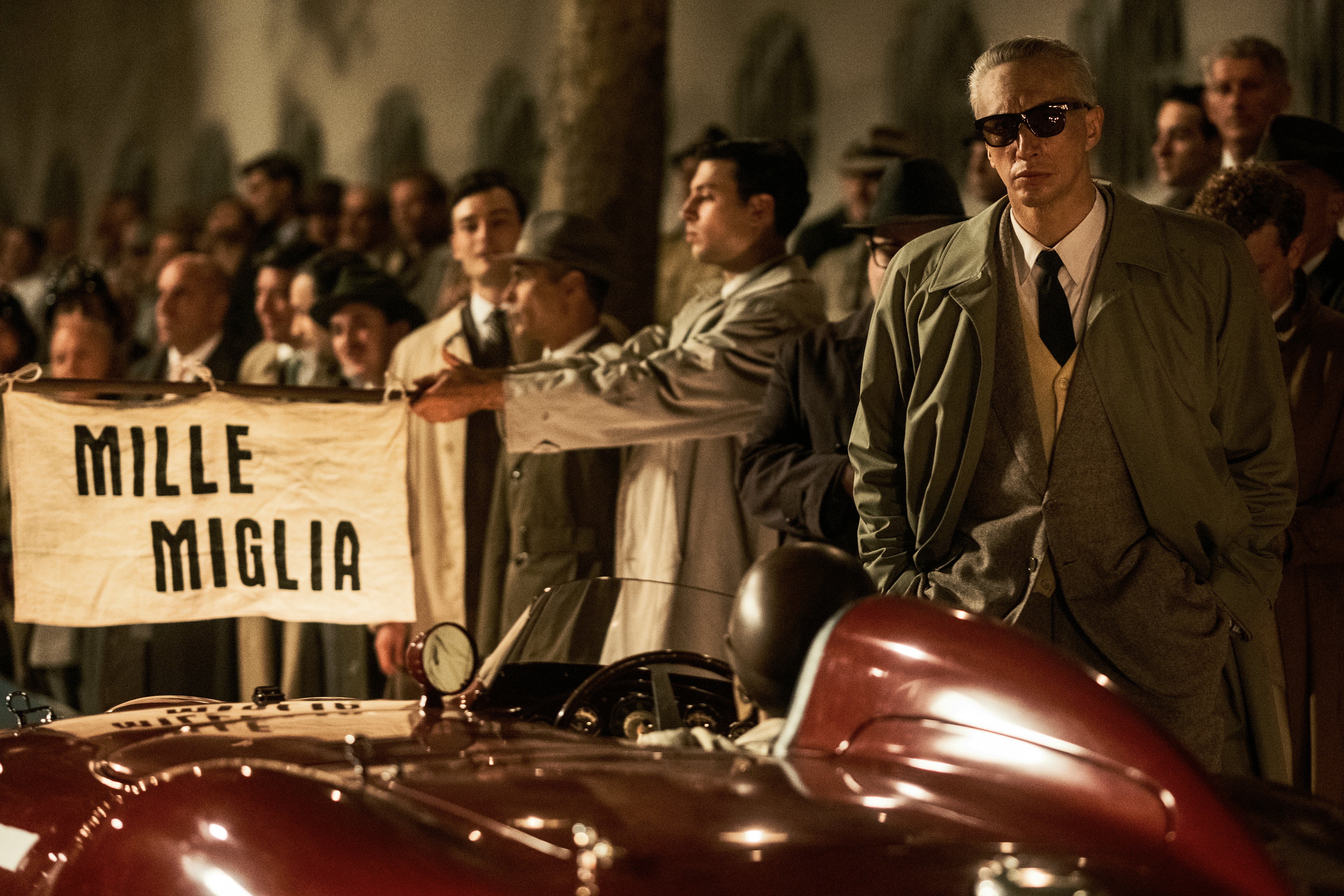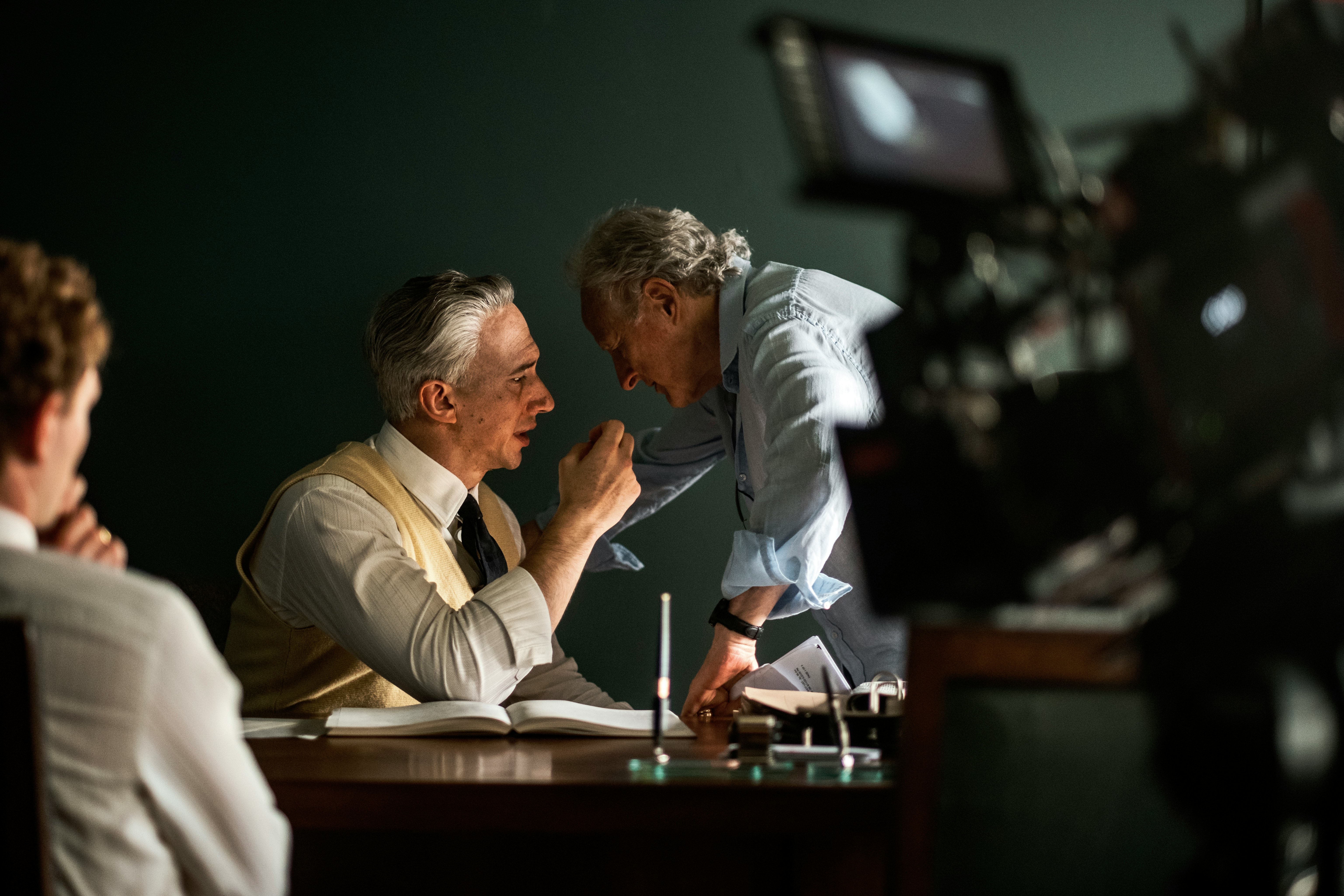
Michael Mann has never really made a movie like Ferrari before. It’s a racing drama that is essentially split, both visually and narratively, in two. One half of it is a stately character drama about a man (Adam Driver’s Enzo Ferrari) trying to reckon with his dueling responsibilities to his mistress, Lina (Shailene Woodley), and their young son, and to his wife, Laura (Penélope Cruz), whose marriage to him has been in shambles ever since the demise of their one and only child. Its other half is a tactile thriller that puts you in the front seat for all of its dangerous, shockingly deadly races.
Over the course of its 124-minute runtime, Ferrari keeps the two halves of itself largely separate. Like Enzo’s two families, though, the line separating Ferrari’s austere and thrill-seeking sides eventually crumbles. When it does, the film emerges as a bittersweet tale of masculine egotism and moral compromise. The drama, in other words, fits right in with so many of the other films that Mann has made throughout his staggering career. Few filmmakers have depicted the difficulties of achieving personal and professional fulfillment as beautifully as Mann has over the past 40 years.
Ferrari isn’t the filmmaker’s best exploration of that topic. How could it be, when it’s competing against classics like Thief and Heat? It is, nonetheless, a fiery, well-executed addition to Mann’s existing oeuvre, one that beautifully articulates the heartbreak of having to choose between your professional reputation and your desire for a better life.

It’s been eight years since Michael Mann’s last film, the Chris Hemsworth-led 2015 cyber-thriller Blackhat, which is better than its reputation suggests. In that time, Mann has co-written a sequel novel to his 1995 crime epic, Heat, and directed the first episode of the Japan-set Max series, Tokyo Vice. Eight years is too long to go without a new movie from a director like Mann, though, whose work has made him one of the foremost American cinematic auteurs of the past 50 years. Ferrari, notably, lacks the same digital-photography-based expressionism and heightened style of Collateral, Miami Vice, and Ali, but every one of its frames pulses with an authorial control that is, at times, overwhelming.
The film ironically lacks the propulsiveness of its maker’s previous films. For all of its wind-in-your-face racing sequences, Ferrari prefers to linger in the still moments of its characters’ lives. That doesn’t always work to the film’s benefit, and there are instances throughout its first and second acts where you could start to wonder whether it’s cruising along too patiently for its own good. That said, Ferrari is, in the purest sense of the word, operatic. It’s a film of big emotions and even more titanic ruminations on the complexities of grief, ambition, and love. In one argument with Cruz’s Laura about his failure to save their son’s life, Driver’s Enzo bellows, “The father deluded himself!” Maybe it’s the film’s old-world Italian setting or the all-in nature of Driver’s performance, but rather than cringe, your heart breaks.
Thanks to Driver and Cruz’s simmering performances, Ferrari has two vessels capable of communicating its volcanic emotions. The two performers bring enough weight to justify every moment that Mann spends on their faces. At every turn, Enzo and Laura seem to be on the verge of cracking or combusting — a tension that reflects and complements the dangerous reality of the climactic race that Enzo is hellbent on ensuring his team wins. When they both let the rage and heartbreak they feel for each other spill out, it seems like only a matter of time before a car is going to end up careening through the air. Mann, to his credit, delivers on that unspoken promise in a brutal, horrifying fashion.

Above all else, Ferrari is concerned with legacy. It painstakingly charts the victories, defeats, and concessions that allowed its eponymous entrepreneur to secure his. When the film begins, Enzo’s personal and professional lives are on the brink of falling apart. His company is nearing bankruptcy and, despite his disinterest in Ferrari’s financial circumstances, Enzo is forced to find a way for its reputation to be restored. In doing so, he has to bring Cruz’s Laura back into the fold and risk the destruction of his idyllic, not-so-secret second life with Lina and their son.
Like so many of Mann’s previous cinematic heroes, Enzo doesn’t treat the choice between glory and integrity as one that he ultimately has any agency over. That doesn’t make the circumstances that prevent him from achieving both any more bearable, though. “Two objects cannot occupy the same point in space,” he says during a pivotal meeting with his drivers. In both Michael Mann’s cinematic universe and the real world, the same is often true of love and work, honor and joy.
Far too often, to live is to choose between what you want and what must be done. Ferrari doesn’t just understand that — it forces us to bear witness to the wreckage that inevitably comes when one man tries to have it all.







